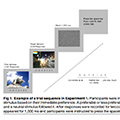Abstract
An important factor affecting preference formation is the context in which that preference decision takes place. The current research examined whether one’s preference formed for a previously presented stimulus influences the processing of a subsequent preference decision, henceforth referred to as the preference sequence effect. Using a novel sequential rating/judgment paradigm, the present study demonstrated the presence of a preference sequence effect using artistic photographs and face stimuli: A neutral stimulus was preferred more following a preferable stimulus than a less preferable stimulus. Furthermore, a similar trend was found even when the potential influence of response bias was controlled. These results suggest that an assimilative sequential effect exists even when sequential judgments are made solely based on one’s subjective feeling; preference formed for a preceding stimulus modulates preference for a subsequent stimulus. This implies the need for a consideration of trial sequence as a factor creating a psychological context affecting the subsequent preference decisions.
